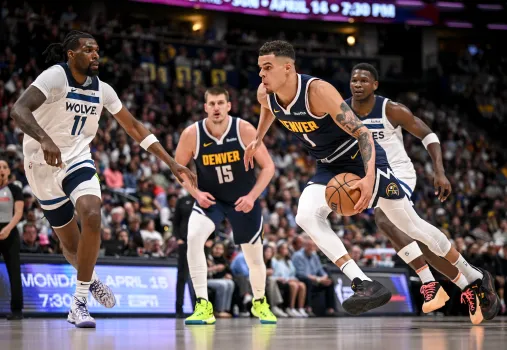This clash of Western Conference giants was bound to happen. There are just too many connections between the Denver Nuggets and the Minnesota Timberwolves. Both teams have been circling each other all season, with coaches spending hours thinking of counter-strategies. Each team has a real shot at the championship. This is Denver’s toughest playoff opponent in the last two seasons, making the path to an NBA repeat much harder than last year’s, which began against the No. 8-seeded Timberwolves.
It all started with Tim Connelly’s involvement in both teams. Ten days after he became Denver’s top basketball decision-maker in 2013, the Nuggets traded the No. 27 pick to the Utah Jazz, who used it to draft Rudy Gobert. Connelly’s first big move as the Wolves’ new president of basketball operations in 2022 was to trade a haul to pair Gobert with Karl-Anthony Towns, Minnesota’s other star big man. In Denver, Connelly had long considered pairing Nikola Jokic with a rim protector, sources say.
Calvin Booth, now Denver’s general manager, once played for the Wolves and worked in their front office before Connelly brought him to Denver. Chris Finch, the Wolves’ head coach who recently injured his knee, was an assistant in Denver when Jokic became a starter. Micah Nori, the Wolves’ assistant who may step in if Finch can’t, also worked in Denver under current Nuggets head coach Michael Malone. Malone’s staff includes Ryan Saunders and David Adelman, sons of former Wolves head coaches. Saunders himself was the Wolves’ head coach for parts of three seasons.
The pivotal moment for the current Nuggets team is often traced back to Dec. 15, 2016, known as “Jokmas,” the day Malone made Jokic the starting center. However, the moment that really solidified the Nuggets as contenders happened in Minnesota on the last day of the following season, when Denver lost an overtime game that would have secured them the No. 8 seed in the playoffs. Jokic walked through the plane on the way back to Denver, thanking everyone and promising they would get better. It was the kind of gesture that made the disappointment fade quickly, Connelly told ESPN in 2020.
In last year’s first-round playoff series, Denver jumped to a 3-0 lead over the Timberwolves, who were missing key players due to injury. Towns struggled, scoring only 21 points on 8-of-27 shooting in the first two games and committing more turnovers than made field goals. However, the Wolves didn’t quit. Anthony Edwards shined in the spotlight, and the Wolves found a defensive scheme that gave Denver trouble by slotting Towns onto Jokic and letting Gobert rove. They won Game 4 and pushed Denver to the limit in Game 5. After Denver won the championship, some within the Nuggets’ camp said Minnesota had been their toughest postseason test.
The Wolves are stronger now—bigger, more physical, and dialed in on both offense and defense. They recently overpowered the Phoenix Suns with their defense and showed precision on offense with their passing and cutting. Meanwhile, the Nuggets struggled in their five-game win over the Los Angeles Lakers, with Murray shooting only 40% and battling a calf injury.
Denver’s bench, younger now with Bruce Brown and Jeff Green gone, faltered a bit. In Game 5, Malone staggered Christian Braun and Peyton Watson to maintain some shooting, leading to more of Murray and Reggie Jackson, a smaller pairing that might struggle against the Timberwolves’ size.
On paper, these teams are evenly matched. They are No. 3 (Minnesota) and No. 4 (Denver) in point differential, with the Wolves boasting the league’s top defense and the Nuggets maintaining a powerful offense despite taking the fewest 3-pointers. Denver has a solid defense, ranked No. 9 overall, built with size and speed around Jokic and Murray.
The Wolves’ biggest challenge is making smart offensive decisions, especially without Mike Conley on the court. Their defense is relentless and can hinder Denver’s efficiency, but they will need consistent scoring to secure a win.
The Gobert trade was a big bet on Edwards’ development as a playmaker, even though he’s only 22 years old. But Edwards showed he could handle the pressure against the Suns, consistently making the right play and trusting his teammates to finish. Towns also settled down, pausing to think before attacking.
The Wolves will need that same poise against Denver’s defense, which tends to be aggressive but can switch it up to confuse Edwards. Jokic will be the primary defender on Gobert, allowing Gobert to play off Gordon and invade Jokic’s passing lanes. This gives the Wolves a chance to explore different offensive schemes, relying on teamwork to create open shots. If Edwards and Towns can maintain their focus, and if Gobert finishes plays, the Wolves have a path to victory.
On the other hand, the Nuggets have their own counters. They can force Gobert to stay on Gordon by using Gordon as a pick-and-roll screener or even as a ball handler. If Gobert moves out of position, it opens up opportunities for other Nuggets players. The Nuggets will also use their usual tactics, like the Murray-Jokic pick-and-roll, but might adjust to focus more on Murray if he’s healthy.
Ultimately, Denver has the edge in terms of experience and home court, along with the world’s best player in Jokic. If Murray is healthy and shooting well, the Nuggets will be difficult to beat. But the Timberwolves are stronger than ever and have the tools to make this series a real battle.















































